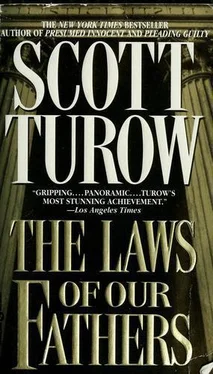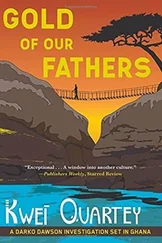Scott Turow - The Laws of our Fathers
Здесь есть возможность читать онлайн «Scott Turow - The Laws of our Fathers» весь текст электронной книги совершенно бесплатно (целиком полную версию без сокращений). В некоторых случаях можно слушать аудио, скачать через торрент в формате fb2 и присутствует краткое содержание. Жанр: Криминальный детектив, на английском языке. Описание произведения, (предисловие) а так же отзывы посетителей доступны на портале библиотеки ЛибКат.
- Название:The Laws of our Fathers
- Автор:
- Жанр:
- Год:неизвестен
- ISBN:нет данных
- Рейтинг книги:5 / 5. Голосов: 1
-
Избранное:Добавить в избранное
- Отзывы:
-
Ваша оценка:
- 100
- 1
- 2
- 3
- 4
- 5
The Laws of our Fathers: краткое содержание, описание и аннотация
Предлагаем к чтению аннотацию, описание, краткое содержание или предисловие (зависит от того, что написал сам автор книги «The Laws of our Fathers»). Если вы не нашли необходимую информацию о книге — напишите в комментариях, мы постараемся отыскать её.
The Laws of our Fathers — читать онлайн бесплатно полную книгу (весь текст) целиком
Ниже представлен текст книги, разбитый по страницам. Система сохранения места последней прочитанной страницы, позволяет с удобством читать онлайн бесплатно книгу «The Laws of our Fathers», без необходимости каждый раз заново искать на чём Вы остановились. Поставьте закладку, и сможете в любой момент перейти на страницу, на которой закончили чтение.
Интервал:
Закладка:
I can speak only for myself. I liked the dude. I'm here as his friend. Soundin goofy, I know, sayin I was friends with a fella twice my age. But we were friends. When I was a little kid, he scared the livin hell out of me. I remember him wearing those nasty glasses that looked like they pinched your nose – pince-nez? – and talking with that funky Viennese accent? Half the time to start, I couldn't tell if he was speaking to me or clearing his throat. I wanted no part of this cat.
But by high school, I had gotten into him. I can tell You a lot of good things about Mr Weissman. He was funny. Kind of sneaky funny. He'd catch you. I remember a few years ago, I was visiting, and we were talking about the things we talked about often, politics, race, America, and I said I saw how the government had finally relented and was going to let a group of black and Jewish leaders go together to visit various capitals in the Middle East, hoping to make peace. 'Zere is no kvestion, Hopie, zat ze government vants zem to go,' he told me. 'Zey vould razzer, however, zat zey not come back.'
And something else I always appreciated about the man – he liked me. Part of that, I always knew, was for Seth's sake. Bernhard was doin the best he could, takin to Seth's main man, even if he couldn't always do the same for Seth. But he was into me for me, too. I had no doubt about that. I could make him laugh. And he had no trouble with a Negro kid being smart. He was not born American and he did not have a trace of our color-thing, not even a speck of it, on his soul. I appreciated that, I must say. And I have to allow, on my side, that it was easier for me to accept him than many other white folks, because he had paid the price. I couldn't ever say to him, 'You don't know what it's like.' He knew. He understood how it felt to be stuck in this situation, to be labeled and judged, always and constantly under the weight of something you never really fully chose.
You know, I'm like everybody else on the planet: I am deeply struck by the suffering of my own. It's a terrible truth that identity is steeped in the blood of martyrs, a phenomenon you can see clear round the world, people everywhere grouped under ethnic banners and all of them beefin about the way their kin were treated in times past. The Armenians, the Kurds. The Igbo. The Rom. The list is damn near endless. Everybody recalls their oppressors. Even the Pilgrims, WASPs, who I grew up thinking had everything, celebrated Thanksgiving to recollect how bad folks back in England had been to them. And the fact is, nobody's makin this stuff up. We cannot bear homage to those who made us without recognizing their suffering. But it's a sad lesson, nonetheless, that we all so often lay claim to our heritage out of fear of those who once hated us and thus may do so again.
But I'm like the rest: I have always known the pain of black folks. All my life. I've felt it in my bones. We had it good in my home, no complaint about that, but it didn't take me very long, even as a little kid, to notice how hard it was for so many others, and to see that a whole lot of those folks had the same skin on them as I did. I'm the first to tell You that I did not have a clue what to do with that. As a young man, I didn't want the burden. And then I discovered I'd never know myself, never accept myself, unless I took it up. And the absolutely amazing part, as I look back, is that the person who taught me more about dealing with that – the man in my life – is Bernhard Weissman. I'm sure, if there had been some cagey old ex-slave who lived down the block, I'd have sat at his feet instead. But there wasn't. I guess Bernhard was the closest thing I could find, a firsthand victim of unbearable oppression, someone I could ask what I see now I was always askin him, even though I never once said it out loud, namely, How do you come to terms?
The last time I saw him, I was asking that again. I was truly in a state. Upset. I was trying a lawsuit, a very confusing lawsuit. It was confusing to me, because I saw what I see every day in a new light. Usually, I view the life of the ghettoized as a professional. I see it case by case: one crime, one rousting, this thieving client, that dishonest cop. I render what aid I can on that basis, one at a time. But being home, I somehow lost my grip on my professional perspective. I saw the larger picture again, and it was, at moments, heartrending. A terrible thing is happening here. In our midst. And I saw how hatred and desperation may yet engulf us all.
And I talked to Bernhard about this. We walked. We went out there, not far away, and inched along the Midway, that beautiful tree-lined esplanade, with its benches, on the west side of U. Park. It was one of those mysterious late autumn days in the Midwest, the pewter sky losing the hope of light, the big trees stretching black and stark, the walks slick with moldering yellow leaves. Bernhard listened to me as I confided my anguish, and he confronted me with an odd question.
'Do you know, Hopie,' he asked, 'vere zis Mid-vay comes from?'
I didn't of course. So he told me the story. During the Civil War, after the Yanks had freed the Mississippi River, they used to freight Confederate prisoners up here, far from the front lines. These rebs – 20,000 of them – ended up imprisoned here on the land that now stands beneath the Midway. The city was pretty much a wreck by then. There were no provisions. Everything was being commandeered for the front. There wasn't food to spare, nor coats nor blankets. And in the dead of winter, these prisoners, Southern boys, some who'd barely seen a frost, just basically stood out here on the Midway and died. Froze to death. More than 12,000 of them. They buried those Confederate soldiers right there. And after Dixie was subdued, the city fathers, embittered by war and eager to forget its horrors, plowed the ground over and planted grass and trees, rather than raise gravestones.
You think about that, though. Those lovely stone mansions, up on Grand Boulevard, they were there by the 1850s. It was a fashionable street. Ladies in their hoop skirts went perambulating up and down every day. They walked their babies. And yonder, behind a mess of wire and fences, stood the rebs, huddling under the trees for cover in the snow, freezing and screaming and carrying on, crying out for mercy, and dying. Every day a couple got shot trying to escape.
It was something for me to think about, of course, because it called up all of an African-American's complicated feelings about the Civil War. I still cleave to a schoolboy's understanding of those events, because I think it is fundamentally correct. In the minds of many of those fighting – probably most – it was the War to Free the Slaves. Oh sure, it had a thousand other motives, too, Genovese and them-all, I've read the books. But for the most part there were Americans who, no matter how they varnished it over with talk of states' rights or the cotton economy, were willing to die for the right to own a nigger, and other Americans, hundreds of thousands of them, white Americans, prepared to lay down their lives because God wanted all his children, including the black ones, to be free. I often think we'd do well in this country to bear both facts in mind. Surely I had them in mind at that moment. And although a part of me listened to Bernhard's story in shock, to think that I had walked a thousand times across the unmarked graves of young soldiers who died so pitifully in their own country, another part of me – the greater part, I confess – heard this with the parched thirst of a people who have never had a full measure of revenge. For it occurred to me at once that those men, cruelly imprisoned, were slaveholders and their supporters. And I thought to myself, Good, this was good, this was as it had to be. Well, there was a look we shared then, Bernhard and me, he the survivor of a similar captivity and I the great-grandson of slaves. He read the thought passing behind my eyes as surely as if I had spoken it, and I do not believe we exchanged another word as we walked slowly home.
Читать дальшеИнтервал:
Закладка:
Похожие книги на «The Laws of our Fathers»
Представляем Вашему вниманию похожие книги на «The Laws of our Fathers» списком для выбора. Мы отобрали схожую по названию и смыслу литературу в надежде предоставить читателям больше вариантов отыскать новые, интересные, ещё непрочитанные произведения.
Обсуждение, отзывы о книге «The Laws of our Fathers» и просто собственные мнения читателей. Оставьте ваши комментарии, напишите, что Вы думаете о произведении, его смысле или главных героях. Укажите что конкретно понравилось, а что нет, и почему Вы так считаете.












